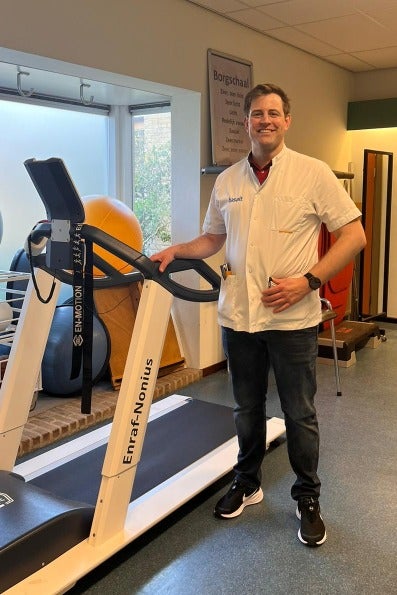After finishing his bachelor (hbo) in physiotherapy, Jeroen Pisart began working as a physiotherapist, but he wanted more. Many specialisations within physiotherapy are focused on a specific skill, but Jeroen wanted to delve more into the foundation of physiotherapy. This led him to enrol in the master’s programme in Musculoskeletal Physiotherapy Sciences at VU Amsterdam.
The combination of theoretical study and practical application at MPS, along with opportunities for experimental research, appealed to him. Jeroen: “You’re going to carry out scientific research, you draw up a hypothesis that you then prove or disprove. You learn to think critically and realise that science is not always black and white.”
The movement analyses conducted in the Musculoskeletal Physiotherapy Sciences programme are a good example of applying scientific principles, says Jeroen. “First you learn how something works, then you apply it, so you really understand what you're doing.” In addition, there was good guidance from the lecturers in the programme: “There are lecturers with highly specialised knowledge who are very approachable for students with questions about science.”
Jeroen now works at a rehabilitation centre where he works with people who are rehabilitating after heart failure. He draws up programmes, defines goals and guides the patients in achieving their goals. Additionally, Jeroen co-writes protocols within the organisation, conducts literature research, contributes ideas about new programmes and is part of the heart rehabilitation expert group.
According to Jeroen, the master's in Musculoskeletal Physiotherapy Sciences is suitable for students who are curious and want to understand the theory behind the practice. “If you don't want to just perform tasks but also ask the question why.” And, Jeroen emphasises: “It is a study for people who want to improve themselves in the profession, but also want to improve the profession as a whole.”
In addition to the lecturers and the material, your fellow students are also a source of knowledge, Jeroen suggests. “There are international students with different views and backgrounds. They may have different ways of dealing with issues and problems. Be sure to also learn from each other.”
